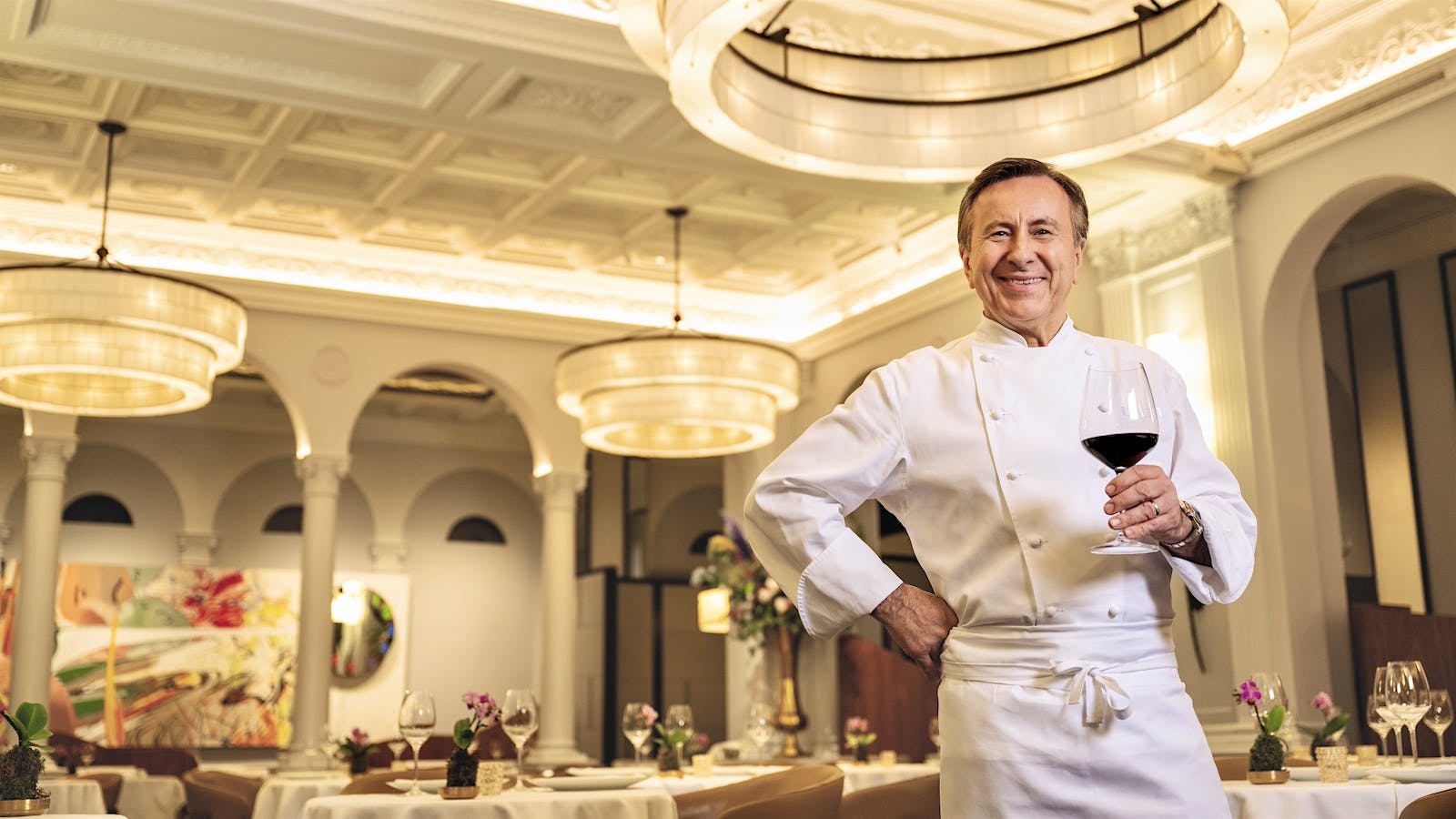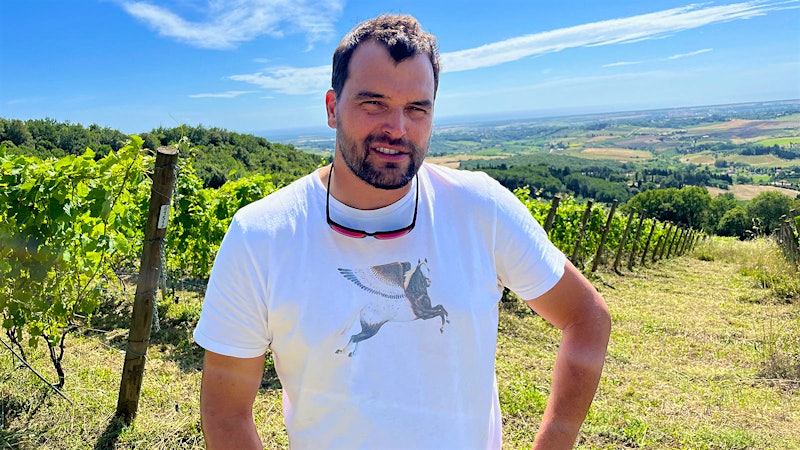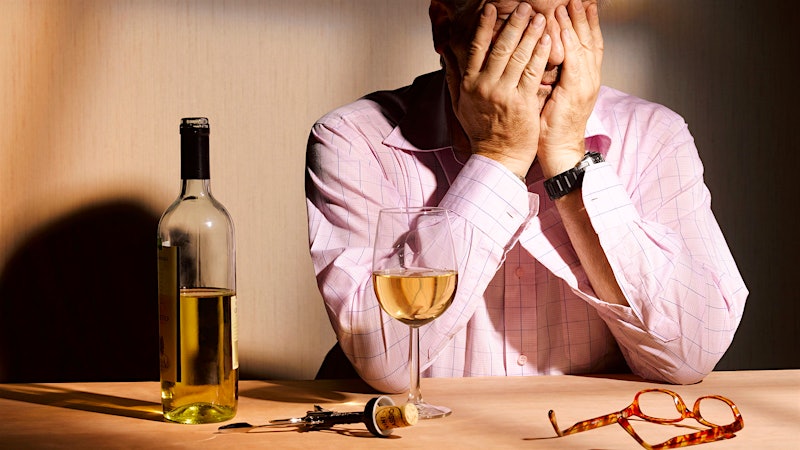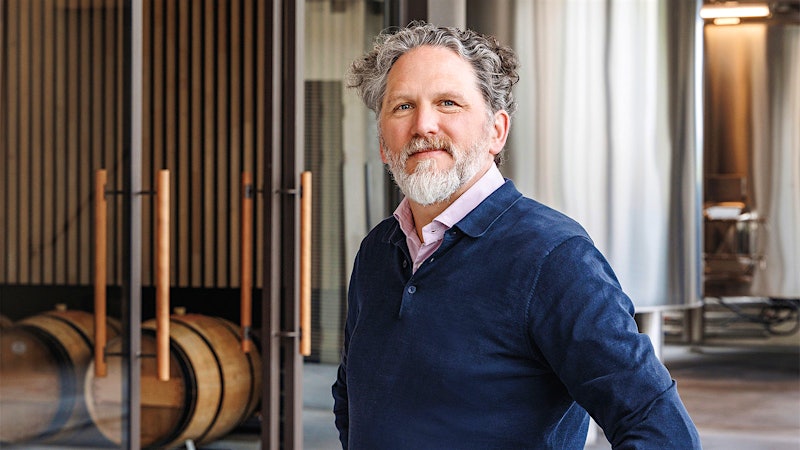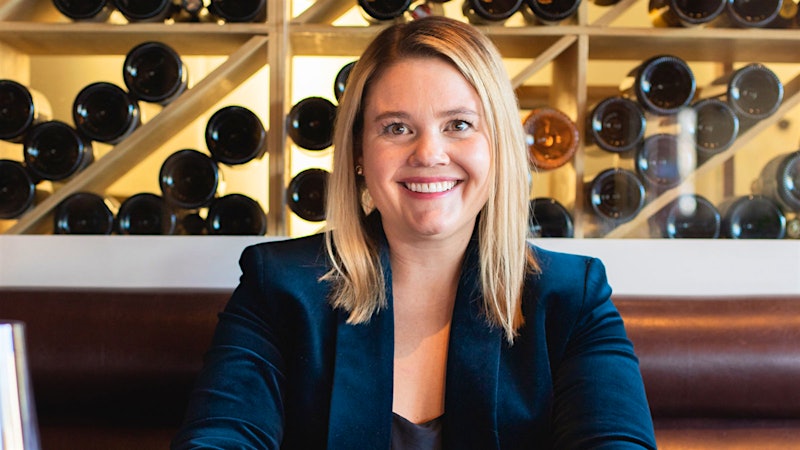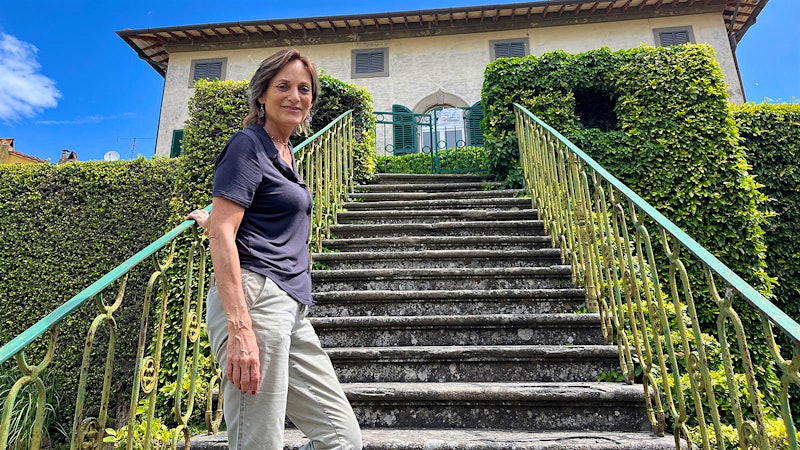It’s Thursday at 1 p.m. in the kitchen of Le Pavillon in New York. Chef and owner Daniel Boulud is arranging crispy, crushed Yukon Gold potatoes around fillets of grilled black sea bass on plate after plate in rapid fire, then speedily garnishing each with pine nut gremolata. Lunch service had started out calmly enough, but amidst the tightly timed business lunches, a bunch of large groups just ordered the elaborate six-course tasting menu. The kitchen’s engine begins humming in a higher gear. Two dozen cooks are heads down, brows furrowed at their stations. Servers are scrambling. A few tempers flicker.
“We’re getting pounded!” says Boulud, smiling with obvious pleasure. At 68 years old, the renowned chef and restaurateur is clearly as energized as ever by the adrenaline jolt of a high-octane professional kitchen.
Le Pavillon is one of Boulud’s most ambitious new undertakings, a grand, soaring restaurant on the second floor of One Vanderbilt, the new $3.3 billion 77-floor skyscraper located across the street from Grand Central Terminal in Midtown Manhattan. “We opened in 2021 in the middle of the pandemic, but I knew New York would come back, and that people would want luxury,” Boulud explains.
It’s named in honor of the original Le Pavillon, which reigned as New York’s grande dame of French haute cuisine until it closed in 1971, ushering in the now-bygone era of the “Le’s and La’s” as Boulud refers to them—La Caravelle, La Grenouille, Le Périgord, La Goulue, among others.
Ironically, it’s the exact species of French restaurant that Boulud and his generation of passionate French chefs effectively supplanted when they transformed the American fine-dining landscape in the 1980s and 1990s. It’s quintessential Boulud, who is deeply rooted in Old World culinary classicism while at the same time driving its modernist evolution. “I wanted Le Pavillon to be about the past and the present. It’s good to celebrate history, to honor what came before.”

After lunch service, Boulud dashes up to the 55th floor to check on the restaurant he runs in Centurion, the 11,500-square-foot American Express club with wraparound views of the Manhattan skyline. His team is prepping for a private event featuring a performance by the musician Jon Batiste later that evening. Then it’s a long elevator descent to Jōji, his Japanese multi-course omakase sushi den hidden in a small nook underneath Grand Central.
“Meet executive chef George Ruan—he worked at Masa for 20 years and he’s like a magician with fish,” Boulud beams, patting Ruan on the back as he carefully slices thin strips of akamatsu (sea perch) flown in fresh from Japan. Open less than two years, the 18-seat Jōji remains one of the hardest-to-score reservations in town.
Seeming to appear everywhere at once, Boulud has more energy than many chefs less than half his age. By 3 p.m. he’s headed uptown, to the nucleus of his restaurant universe on the Upper East Side, where he spends the rest of the afternoon and evening bouncing between the kitchens at Restaurant Daniel—his crown jewel which debuted in 1993—and the recently reopened Café Boulud.
The new Café Boulud is located a dozen blocks south of—and feels a bit slicker than—the original, which was a beloved bistro forced to close after more than two decades when its landlord, the Surrey Hotel, declared pandemic-related bankruptcy. Spiritually, its roots trace much further back, to the Café Boulud his great-grandparents opened in 1901 on their family farm near Lyon, France, where Boulud grew up. Executive chef Romain Paumier is already proving himself one of the most skilled young talents in New York City today.
“If I didn’t try to compete at the top of fine dining, trying to be among the best restaurants in New York with Restaurant Daniel, Café Boulud is the restaurant I would live with forever,” Boulud shares. “I could be very happy as a chef running just this restaurant.”
Really? It’s a testament to Boulud’s inherent charm that this sentiment sounds believable, because his large and still-growing empire suggests he is not that sort of chef at all.
After five-plus decades of working in professional kitchens, Boulud is juggling more today than he ever has, with a string of recent openings and more to come. His culinary organization, the Dinex Group, oversees five Café Boulud operations (Palm Beach, Fla.; Toronto; the Bahamas; the just-opened Beverly Hills venue; and one planned for Riyadh, the Saudi Arabian capital). In addition to his seven restaurants in New York (where cellars hold a cumulative 40,000 bottles of wine) and the fast-casual chain of Épicerie Boulud, he operates fine dining outposts in Montréal, Singapore, Miami and Dubai. In 2022 he opened Le Gratin, a Lyonnaise bistro in lower Manhattan. And later this year, he will unveil La Tête d’Or, an American-French steak house at One Madison Avenue.
“We will be located next door to EMP” [Eleven Madison Park, the world’s first three-Michelin-star vegetarian restaurant, by chef Daniel Humm]. “So people can eat their vegetables there and then walk next door to have a steak with us,” he laughs. (He and Humm are good friends).
“Daniel works harder than anyone else I know and has a collection of skills that very few have,” says Sebastien Silvestri, CEO of Boulud’s Dinex Group, which employs over 1,000 people. “There are other incredible chefs like him, but being a successful restaurateur requires business sense and warmth. You need to have kindness and love, and he has it all.” Plus, there’s his energy. “There are 20 years [of age] between us, and I struggle to keep up with him. All day he spends running his large business, and every night he’s in his restaurants for service and talking to every guest.”

Boulud admits that he is working as hard as he ever has, putting in the same 16-hour days he did as a young chef. “I know I work too hard; I sacrifice a lot of time with my friends and family. But my passion for cooking and restaurants burns just as hot now as always. For some great chefs, they arrive at the end of a road and they shut down their restaurant to start new again—but I would rather just open another restaurant. I love to keep the excitement going with new projects and to create new opportunities for my team. I’ve always loved the theatrical life of the restaurant.”
Some close to him suspect a deeper motive for his seemingly manic pace. “Daniel believes there is a larger legacy of hospitality and cuisine that he can leave behind, and I think he is coming to that realization at age 68 more than ever before,” says Gavin Kaysen, who was executive chef at Café Boulud for eight years before launching his own acclaimed restaurants in Minneapolis.
“He has so much gratitude to his mentors, chefs like Paul Bocuse, Michel Guérard—they came out of the kitchen, they had emotion, they connected with people. They paved the way for Daniel’s generation and he wants to focus on what he is building for our generation.” Also, Kaysen adds: “There is this little voice in his head that is always pushing himself to be better than he was the day before; Daniel is never totally satisfied with what he has created.”

Boulud encountered a very different American culinary landscape when he arrived in 1980 at age 25. “French cuisine was more predictable and less personalized at that time; a lot of it was boring,” he describes. Boulud’s résumé included some of the most prestigious kitchens in France, where the nouvelle cuisine revolution was already well under way.
But U.S. kitchens in 1980 were still offering a calcified version of French fare that had taken hold in the 1950s. “In France we had this passion for ingredients: Chefs were closely connected with their purveyors and their menus were directed by the season,” Boulud explains. “We were always hunting for the best mushroom, the best wild game. In the U.S., you had Dover sole meunière on the menu and it stayed there forever.”
His first stateside gig was as chef for the Ambassador of the European Commission in Washington, D.C., the same town where his friend Jean-Louis Palladin—a pioneer of the farm-to-table movement in America—had just opened his namesake restaurant at the Watergate Hotel. Palladin started convincing local farmers to raise squab, rabbit and duck, and fishermen to dive for scallops and harvest lamprey (small eel-shaped fish) in the rivers of Maine. “We were looking for the excitement of cooking like we cooked in France, so we were embracing American ingredients that could match the quality of what we could get at home,” says Boulud.
Determined to get to New York, Boulud landed a stage at La Côte Basque (where Truman Capote was a regular) and then as a chef at the Polo Lounge on the Upper East Side, where he worked alongside a young Thomas Keller, who would go on to open the French Laundry. His leadership skills were already showing in the kitchen, according to Keller, and the two grew very close. “Besides being a best friend, Daniel has been a strong supporter and a mentor to me,” says Keller. “He’s an incredible chef and a true leader in our profession. I feel extremely blessed to have him in my life.”
The pace and intensity Boulud discovered in New York kitchens was unlike anything he’d experienced. “At La Côte Basque, I was so impressed by the energy of this restaurant,” Boulud describes. “The pressure they were living every day was so intense, but it was a pressure that I wanted to be part of.”
At his next stint, as executive chef at Le Regence at the Hotel Plaza Athénée, he met Daniel Johnnes, who was a server. The two became lifelong friends and Johnnes has been the corporate wine director for Dinex Group since 2005. “I remember Daniel as this absolute fireball of energy in the kitchen,” Johnnes recalls. “He has evolved as a chef and has become a great businessman, but his stamina seems the same as it was in those early days. And he still works just as hard.”

Boulud’s star was rising, and in 1986, Sirio Maccioni, the legendary impresario who owned the city’s then-hottest restaurant, Le Cirque, hired him to make the food as compelling as the glittering scene. “Everyone told me, ‘good luck.’ Le Cirque was a train that was already running, and I had to jump on board,” Boulud says. “In the early ’80s, New York was on fire and Le Cirque was at the center.” He set out to update the menu, elevating the Friday bouillabaisse and the Thursday night pot au feu through better ingredients and building more flavor. “The food needed to be recalibrated—more complexity, more panache.”
It was here Boulud created what has endured as perhaps his most iconic dish—the paupiette of sea bass, a roasted fillet wrapped in a golden, crackling layer of thinly sliced potatoes in a red wine sauce, which is still on the menu at Café Boulud today. “I created that dish on the fly 40 years ago, more nouvelle cuisine than classic, and have sold more of that than anything else in my career,” he notes. Within a year of Boulud taking the reins, Le Cirque earned the coveted four-star review in the New York Times in 1987, which distilled his signature style as emphasizing “purity and accessibility over elaborateness.”
Diners fell in love with the menu and the man. Boulud made fine dining fun—there was a playfulness coursing alongside the white tablecloth formality and professionalism. Ronald Perelman, finance mogul and Revlon owner, ate lunch at Le Cirque Monday through Friday and always ordered broiled flounder and baked potato. “I was so bored with the baked potato,” Boulud recalls. “So one day I crushed the potato with white truffles, olive oil and butter, put it back into the shell and covered it with shaved white truffles and a bit of beurre noisette. Ron went crazy! It was the most expensive baked potato you could ever have, and he ordered one every day during truffle season.”
Andy Warhol became a regular and a friend, “always coming with an entourage” and a tie knotted around his turtleneck, in mocking deference to the dress code. The famed British fashion photographer Norman Parkinson came every day for lunch, and challenged Boulud to surprise him but to never cook the same meal twice.
The pace was relentless and the days were long. “I lived just two blocks away but sometimes had to take a cab home; I didn’t have the energy to walk,” he recalls. His first daughter had just been born, and he was growing restless at Le Cirque. “Things were so bad in New York in 1990 with the recession, so I made plans to move home to Lyon and open my own restaurant.” Luckily for American diners, Boulud was unable to secure the funding he needed in France, so he returned to New York and opened Restaurant Daniel in 1993.

Some restaurants succeed because they deliver an ethereal, rarified food experience. Others offer a warmth and hospitality that wins the fierce loyalty of its regulars. Daniel manages to accomplish both. The restaurant turned 30 years old last year, and like any director with a long-running hit, Boulud has continued to evolve. “Three decades in the life of a restaurant, we have to always keep dusting off, reinventing ourselves. We are pushing in a new direction today,” he says. At the pinnacle of fine dining, Boulud says, the food must of course be amazing, “but most of all it must make you happy,” he says. There is joy in the food he serves, which likely explains his enduring appeal.
Under longtime chef Eddy Leroux, the kitchen has just unveiled new five-course and nine-course tasting menus. After an elaborate renovation in 2021, the space feels brighter and more contemporary. A steel arch marks the entryway, and wood screens stretch the main dining room, which features the work of internationally recognized American artists, rotated every two years and curated by art advisor Janis Gardner Cecil.
Staying relevant rather than fading can be as much about what you don’t change as what you do. “Daniel has never chased trends, and in today’s world that’s refreshing,” says Andrew Carmellini, who worked with Boulud for eight years before launching his own New York–based restaurant empire. “He has never been the high-flying chef who invented ‘the exploding mango’ trend that everyone copies. What people don’t understand about Daniel’s cooking is that he shines his best when he’s most closely connected to his soulful Lyon farm cuisine. It’s the heart of who he is. He is the last bridge between what the kids are cooking today and what was happening with Michel Guérard in 1975.”
Unlike other captains of large restaurant realms, Boulud is unusually tied to the kitchen, where he has trained some of the best rising stars of our time, amplifying his influence on the entire country’s fine dining landscape. Boulud remains close with the first chef at Daniel, Alex Lee; the two cooked side by side seven days a week for many years, enjoying a rare synergy. “I loved cooking with Alex, we had so much fun in the kitchen together and understood each other perfectly. We would dive into a new dish in the middle of service so spontaneously; we didn’t even have to speak. He is a great technician with excellent sensibility to seasoning. We fueled each other’s creativity. He’s part of the reason Daniel is what it is today.”

What makes a good chef? “To be a very good cook. Because you can’t fake it once you go up on stage.” According to Boulud, the best chefs can do “the high and the low.” “Some chefs can do complicated, technical food, but they don’t know how to do something soulful, rustic and delicious. To me, the ‘low’ is the soul of food that doesn’t have to be fussy to be good. Simplicity is so important, more than fireworks.” Chef candidates interviewing to work with Boulud are often surprised when he asks them to prepare a simple salad with a perfectly balanced vinaigrette.
Alumni of Boulud kitchens come away with technical precision and mastery of an old-school approach—everything is done from scratch and very little is prepped ahead of time. This requires intensity but also spontaneity. “Those were some of the most fun cooking years in my life for sure,” says Carmellini, describing his time as executive chef at Café Boulud, which Boulud refers to as his springboard for young talent. “I joke with Daniel often that I still wish I had that job back.”
In his kitchens, Boulud is known for asking as many questions as he answers. “Daniel is very open-minded and curious; he wants new ideas and to learn from our young chefs. If we have a new chef from Germany or Thailand, he wants to know all their cuisine, how they cook at home,” says corporate chef Jean-François Bruel, who has worked with Boulud for 28 years—18 of those as executive chef at Daniel. “He drives the energy in the kitchen and engages everyone from sous chefs to the commis. He wants to create a family spirit and transfer knowledge in a good way. He wants them to love their craft as much as he does.”
The culture in Boulud’s kitchens also differs from those helmed by the archetypal French chef, famous for volcanic tempers. “I never really saw him angry, I just saw him get intense,” says Kaysen. “It comes from a place of ‘we know better and we are failing the guest.’ It was never about him or his ego, which made him different from most French chefs.”
There was, however, more yelling in the earlier years, Carmellini points out. “It was fascinating to see him go from a rage machine in the kitchen and then walk into the dining room and talk to table 72 and be as charming as ever.”
But there was more at stake back then, more to prove. Boulud admits he has mellowed with success. “I feel a little less pressure now than when I was first building my business, and it shows in the kitchen. In the early days, you are so scared you won’t make it that you push very hard!” Today, when things go sideways mid-service, “I still get emotional but I don’t fight with the cook, I fight with myself and think: ‘How can I get myself out of this problem?’”

It’s 10 p.m. when Boulud makes his third tour around the dining room at Daniel, lavishing personal attention on each table, posing for photos with anyone who asks. (“I follow you on Instagram! You are my favorite chef!”)
“Daniel takes a genuine approach to listening. He’s always trying to draw out a lot of information, which comes from a natural spirit of curiosity,” says Kaysen. “In the dining room, his approach is ‘I am here to serve you. How can I make you happy? How can I make you remember this experience? People are taken aback by that kind of hospitality.”
Kaysen experienced the roots of Boulud’s hospitality in 2008, when he was tasked with an errand to Boulud’s parents’ farm near Lyon. Julien, his father, asked Kaysen to come in for an espresso, then insisted he stay for a four-hour lunch, in the original house where the family had opened Café Boulud in 1901. “I called Daniel when I left and said, ‘I finally get it. You were raised in this tradition of hospitality, it has never been a job for you. This is who you are.’ ” Growing up on his family’s farm is “100 percent why I ended up in hospitality,” Boulud says. Just outside of Lyon, the small village St.-Pierre de Chandieu where he was born in 1955 “hasn’t changed much since the 19th century.”
“The pride of my father was everything we did on the farm—growing the best vegetables, raising the best turkey, squab, duck and guinea hen—my father was a kind of Old MacDonald,” he laughs. Milk from a 50-goat herd was used for six different kinds of goat cheese, from fromage blanc to marinated and aged versions.
“It was a beauty in simplicity and taste,” he recalls. His parents sold to local chefs and also at the market in Lyon, and every family meal featured the farm’s bounty. “We would start every lunch with a salad and every dinner with a soup, then charcuterie. Everything was homemade.” Each dish reflected the season; spring salads featured dandelions and purslane gathered in the field and fresh fromage blanc with roasted baby new potatoes. “And always good salad dressing. My grandmother was the queen of the garlic mustard dressing. I still use her recipe.”
Even the family’s wine was housemade—two large barrels of a rustic red wine produced each year. It was Boulud’s responsibility to go to the cellar and fill up bottles to bring to the table at lunch and dinner. “The wine was very rough and tannic—it would stain the glasses. Hipsters today talk about natural wine; this was the original natural wine!” His desire to become a chef manifested very early. “I knew I wanted to cook, but I did not want to go to cooking school,” he says. At 14 years old, a well-connected neighbor helped him land an apprentice job at Nandron, a two-Michelin-star restaurant in Lyon. He had only dined in a restaurant twice in his life: “It was not part of my family’s culture to eat at restaurants,” he explains.
Trailing behind his boss, chef Gérard Nandron, at the market, he would bump into culinary mega-stars like Paul Bocuse, Georges Blanc, Alain Chapel, the Troisgros brothers. It was a thrilling time to be in Lyon, which was leading the French culinary revolution. “For a chef, being in Lyon in those days was like being a musician in Liverpool when the Beatles were getting together,” he writes in his memoir Letters to a Young Chef. Every morning was a race to the market to get the best ingredients before their competitors got there first. “I remember Paul Bocuse would walk in front and everyone else would follow behind—he was like the president,” Boulud laughs. Everyone would adjourn to the café to have breakfast, a glass of wine, and then return to their kitchens.
After three years at Nandron, Boulud took a job with Georges Blanc, who was helming his family’s two-Michelin-star restaurant La Mère Blanc and elevating the concept of “grandmother cuisine”—traditional peasant fare at a high level. Next, he worked under Roger Vergé at the three-star Le Moulin de Mougins on the French Riviera, which was considered one of the world’s best restaurants in the 1970s (Alain Ducasse, David Bouley and Emeril Lagasse also passed through Vergé’s kitchen). By the age of 17, he was named a finalist for the Best Culinary Apprentice in France.
His next mentor, Michel Guérard in Southwest France, was considered a leading pioneer of nouvelle cuisine. “Guérard was almost spiritual about cooking … I have always thought of him as the poet of French cuisine,” Boulud writes. His salade gourmande became the most copied salad in the world in the 1980s. By then, chefs with classical training were starting to travel and bring back new ideas, and many of them wanted to go to America. Following a brief stint in Denmark, as a sous chef for Vergé’s new Danish restaurant, Boulud headed there as well.

After nearly four decades in the U.S., Boulud officially became an American citizen in 2021, celebrating proudly in the kitchen at Daniel. Photos from that day show Boulud beaming his ready smile with an American flag cake his team prepared. “I’ve lived longer in this country than in France, but I was not able to vote—and that was not a good thing.” Besides, he adds, his wife and children are American. Boulud has a daughter, Alix, with his first wife, Michelle Palmer Boulud. He married Katherine Gage a little over a decade ago and the couple have two young children together: Julien (named for Boulud’s father) and Georgiana. “I am very proud to be an American, even if everyone still thinks I’m French. And now that I’m American, I think I have the right to open a steak house.”
He remains very much a hometown hero in France, particularly in Lyon (where he co-owns a restaurant, Le Suprême, with a local chef) and in the nearby Rhône Valley wine region, where famous chefs and winemakers vie to cook for him. On one trip through the Rhône, the late, legendary Châteauneuf-du-Pape winemaker Henri Bonneau cooked lamb stew at his house, and they stayed up most of the night drinking wine from 1955, Boulud’s birth year. The next day, Jean-Louis Chave, of his namesake domaine in Hermitage, roasted lapin (rabbit), paired with 1955 Hermitage in honor of Boulud. “We called it the 100,000-calorie tour” due to the spectacular indulgence. “When amazing food is on the agenda, my capacity is hardly ever reached,” he says.
Boulud’s journey has not been hardship-free. There were the many hundreds of employees laid off and restaurants he shuttered permanently during the pandemic. He emerged shaken. “There are a few things in life that really scare you, where you see you could lose everything.”
Another sobering low point was in 2014 when Restaurant Daniel was demoted from three to two Michelin stars. It was a serious blow, especially following a lost a star from the New York Times, whose critic complained that many dishes were too elaborate, that the kitchen was trying to “garnish its way to greatness.”
Karim Guedouar, director of operations for Dinex Group, who was the service director at Daniel at the time, recalls that dark day vividly—there was total silence in the restaurant. “It still feels like yesterday. We all felt responsible. Jean-François Bruel was head chef then and I remember him telling Daniel, ‘I’m sorry. I failed you.’ Daniel replied, ‘No, no you didn’t fail me.’ He never lost faith in us, he always believed in us. Almost like a father figure.”
A decade later, Daniel remains a two-star restaurant, and while Boulud maintains that the Michelin stars matter as much as ever, he seems at peace. “When we got the three stars in 2010, I wonder, were we ready? I don’t know. I think we could be a contender to earn it back one day. But I always say, it’s good to be the best of the two stars and push to keep the three-star boys on the edge all the time.”
But if forced to choose between pleasing critics or satisfying his regular customers, he’ll always opt for the latter. “There is nothing more loyal than the New York diner. People come so often, we are part of their lives.” While he once said that being awarded the three-stars was the “grand slam” of his career, he is far more proud of everything else he has achieved. “What I’ve been able to accomplish in America, I did not do it alone. I’m proudest of my team and my legacy of mentorship—I have this family of chefs all over the world; it’s the most exciting and satisfying part for me, seeing them succeed and express themselves.”
And there’s his philanthropy. Serving as co-president of the board of Citymeals on Wheels, an organization that provides meals to New York City’s homebound elderly, Boulud has helped raise over $15 million for the charity. He’s been recognized by the U.N. and French government for his humanitarian work.

Boulud is a chef’s chef, which is to say that nothing brings him more pleasure than cooking for his colleagues. He recalls one of his favorite meals, preparing pig’s head roasted with apples and covered in bacon for a half-dozen friends, including Emeril Lagasse and the late Charlie Trotter, at the original Daniel location. “We cracked it open and everyone got a piece of ear, snout, jaw, apple, bacon jus. This is how to make a chef happy when you feed him—don’t give him caviar, give him a pig’s head.”
In December 2022, Boulud threw a 90th birthday party for André Soltner, the French chef who owned Lutèce, one of the most esteemed restaurants in New York for decades. “Who will do that in 10 or 20 years from now?,” Carmellini wonders. “Daniel holds together the culture and history of restaurants in New York, he maintains the fraternity of chefs. There is no one holding the torch for this in the next generation. He is the center of the restaurant community, part of the living history of New York that is not paid as much attention as it once was.”
When asked about this, Boulud nods in agreement. “Yes, it’s true, the restaurant world is different today. There’s not the same focus on the legacy.” Cooking has changed, too. For example, people used to be a lot more open to eating tripe, calf’s brain and stuffed pigs feet than they are today, he laments. “There were no diets or restrictions back then; people now are more particular.
“I don’t think today’s chefs can be as spontaneous as we were back then. Things are much more programmed. We did a lot of off-the-cuff cooking. Under control? We weren’t always under control, but boy was it fun. The adrenaline rush it would give you …”
Both of Boulud’s parents have died within the last year, at the age of 95. Though he swears he will never retire, he does dream of one day getting their farm in Lyon up and running again and spending more time in the place where his love of food and obsession with flavor all began. There is also the art studio he is building in his country home in upstate New York, where he wants to one day learn to paint.
But all of this will have to wait. Tomorrow there is a tasting for his new steak house. It’s half-past 11 p.m., and at Daniel a few diners still linger at their tables. Boulud says goodnight to his front-of-house team and heads upstairs, where he has already tucked Julien and Georgiana into bed (the family lives above the restaurant).
Is this the greatest challenge of being a chef and restaurateur, the endless sacrifice of one’s life to the craft? “No,” he says, “We devote our lives to this because we share this passion. The greatest challenge is staying in business and building a future for my team.” And then he pauses. “The greatest challenge—the daily work—is to always find the best ingredient.”
The Dinex Restaurant Group
Boulud’s restaurant operations span the globe and employ over 1,000 people. Among the venues are 10 Wine Spectator Restaurant Award winners.
New York City
Daniel (Grand Award)
Bar Boulud (Best of Award of Excellence)
Café Boulud New York (Best of Award of Excellence)
Le Pavillon (Best of Award of Excellence)
Blue Box Café
Boulud Sud
Centurion New York
Épicerie Boulud (four locations)
Jōji / Jōji Box
La Tete d’Or (opening soon)
Le Gratin
Palm Beach & Miami
Café Boulud at the Brazilian Court Hotel (Best of Award of Excellence, Palm Beach)
Boulud Sud at the JW Marriott Marquis (Miami)
Beverly Hills
Café Boulud (opening soon)
Bahamas
Café Boulud at the Rosewood Baha Mar (Best of Award of Excellence)
Canada
Café Boulud at The Four Seasons Hotel (Best of Award of Excellence, Toronto)
Maison Boulud at The Ritz-Carlton (Montréal)
Other International & Cruise Ships
Maison Boulud at the Marina Bay Sands Resort & Casino (Best of Award of Excellence, Singapore)
Brasserie Boulud at the Sofitel (Dubai)
Le Voyage by Daniel Boulud (Best of Award of Excellence, aboard the Celebrity Cruise liners Ascent and Beyond)
Alumni Roster
Chefs who worked in Boulud kitchens have branched out far and wide. Below, some standout members of that group.


